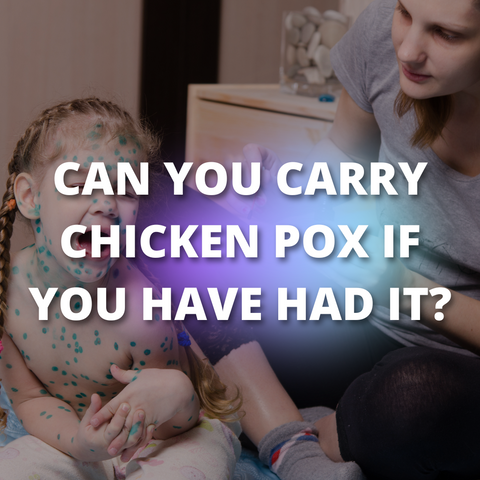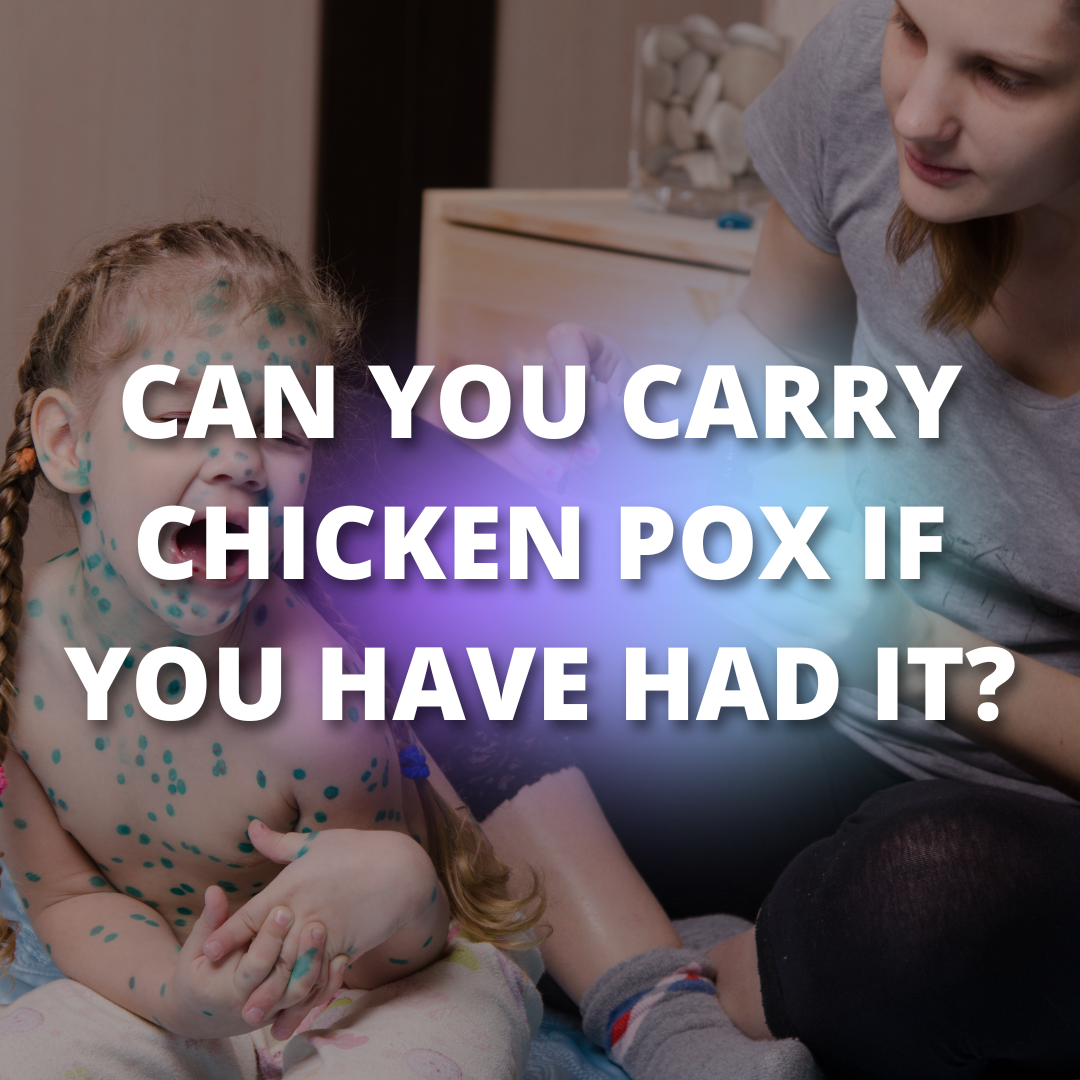Updated: 11.3.25
Is it possible to carry chickenpox if you've had it before?
It's a question that often arises, especially for those with children or those working in healthcare.
This article provides more insights into this question. 
The short answer is no. Once you've had chickenpox, you develop lifelong immunity to the virus, barring a few exceptions. However, there are nuances to this topic that deserve a deeper dive.
Understanding Chickenpox
Firstly, let's clarify what chickenpox is. Caused by the varicella-zoster virus (VZV), chickenpox is a highly contagious disease. Here's a detailed guide on the various stages of chickenpox and its duration.
Symptoms include a widespread itchy rash, high temperature, and malaise. Discover some of the best home remedies for chickenpox.
While commonly associated with childhood, it can strike at any age, and it's usually more severe in adults.
Additionally, it's worth noting that chickenpox isn't just itchy; it can sometimes lead to complications, especially in adults.
These can include bacterial infections of the skin, pneumonia, and, rarely, inflammation of the brain (encephalitis).
This makes early detection, isolation, and treatment crucial in managing the disease effectively.
How Chickenpox Spreads
One key point to remember about chickenpox is its ability to spread easily from person to person.
It's a social butterfly of an illness, hitching a ride through direct contact or airborne transmissions like coughing or sneezing.
Get more insights on how long does the chickenpox virus live on surfaces.
Picture this: if you're in the same room as someone with chickenpox, you might catch it, even without touching them!
But, can you go to work if your child has chickenpox?
This guide answers this common question.
Once you contract it, the symptoms usually appear within 10 to 21 days.
Modes of Chickenpox Transmission
| Mode of Transmission | Details |
|---|---|
| Direct Contact | Touching the fluid from a chickenpox blister. |
| Airborne Transmission | Inhaling the virus particles from someone's cough or sneeze. |
| Surface Contact | Touching contaminated surfaces and then touching your face. |
Getting Chickenpox More Than Once: Is It Possible?
It's very rare, but there have been cases of people getting chickenpox twice. However, it's important to note that this is an exception and not the rule.
Here's a comprehensive article discussing the odds of getting chickenpox twice.
Lifelong Immunity: The Common Case
For the majority of people, getting chickenpox once results in lifelong immunity.
Think of it like this: once you've climbed the mountain, you won't need to do it again.
You're immune. This protection stops you from getting sick from the virus again, even if you come into close contact with someone who's got it.
The Exception to the Rule: Reactivation of the Virus
Here's where things get interesting. Remember we said that VZV stays in your body?
Well, it doesn't just vanish after you've recovered.

It remains dormant, a bit like a bear hibernating over winter. And for about 30% of people, this virus can wake up later in life.
Shingles: A Manifestation of Reactivated VZV
When the dormant VZV reactivates, it doesn't usually cause chickenpox again. Instead, it often leads to a condition known as shingles, which is characterised by painful, blistering skin rashes.
So while you're not carrying chickenpox, you still harbour the virus that could infect others who've never had chickenpox or haven't been vaccinated against it.
Precautions to Minimise Chickenpox Transmission
Even though you develop immunity to chickenpox after having it once, you could still transmit the virus before you show symptoms. If you're a parent, you might ask, "When can my child go back to school after chickenpox?"
So, you might unknowingly pass on chickenpox 1 to 2 days before the telltale rash even appears.
That's why it's crucial to minimise contact with others if you suspect you have chickenpox until all blisters are dry and have formed a scab.
The Role of Vaccination
Understanding the Varicella-Zoster Vaccine
Chickenpox vaccination, also known as the Varicella vaccine, is an effective method to prevent this contagious disease.
The vaccine encourages the immune system to produce a defensive response against the varicella-zoster virus without causing the disease itself.
Typically, two doses of the vaccine are recommended for children, adolescents, and adults who have not had chickenpox in the past.
Although it's not a foolproof guarantee against chickenpox, vaccinated individuals who do contract the disease usually experience milder symptoms and a quicker recovery.
Getting vaccinated
In addition to practising good hygiene, getting vaccinated is another critical step in preventing the spread of chickenpox.
Vaccines can offer protection to those who have never contracted the disease.
They work by training the body's immune system to fight off specific viruses, in this case, the varicella-zoster virus.
While it may not guarantee 100% immunity, it significantly lowers the risk and can lessen the severity of symptoms in those who might still get the disease.
Debunking Common Myths about Chickenpox
Let's bust some common myths about chickenpox. For instance, many believe that chickenpox is merely a 'childhood disease'.
While it's true that it commonly occurs in children, adults can contract it too, often with more severe consequences.
Another myth is that chickenpox parties, where healthy children are intentionally exposed to an infected child to catch the disease, are safe.
In reality, these pose significant health risks and are strongly discouraged by health professionals.
Lastly, some assume that chickenpox and shingles are separate diseases when they are both caused by the same virus, the varicella-zoster virus.
Shingles only occur in individuals who have previously had chickenpox.
In Summary
You cannot carry chickenpox if you have had it before, except in rare circumstances.
After an episode of chickenpox, most people develop lifelong immunity against the disease, meaning they won't contract it again.
However, the dormant virus can reactivate in the form of shingles, which can, in turn, infect susceptible individuals.
The key takeaway?
Practice good hygiene and be mindful of the risks to minimise the spread of chickenpox.
FAQs
How long can chickenpox remain dormant in the body after infection
The chickenpox virus can remain dormant in the body after the initial infection. The virus can reactivate later in life, causing shingles.
The exact trigger for reactivation is not fully understood, but it is believed to be related to a weakened immune system (1).
Some possible causes of reactivation include:
- Emotional stress.
- Physical stress.
- Ageing.
- Weakened immune system due to illness or medication.
- Radiation or chemotherapy.
Once the virus reactivates, it travels along the nerve fibres to the skin, causing a painful rash (2).
The virus can be spread from someone with shingles to someone who has never had chickenpox or the vaccine, but it cannot be spread from person to person through the air (3).








Share:
Can You Spread Chickenpox If You Are Immune? (Updated 2025)
How Long Does The Chickenpox Virus Live On Clothes?